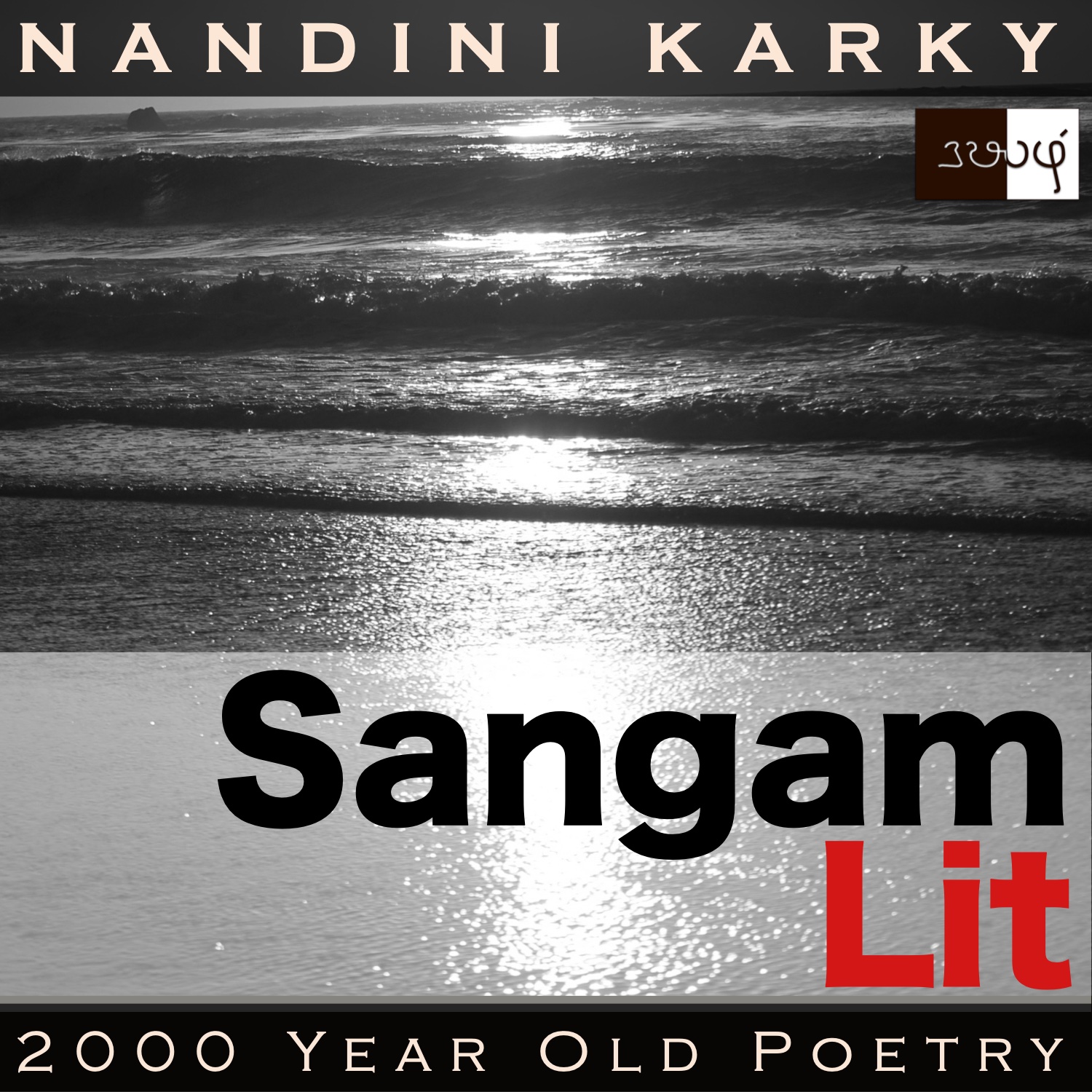Podcast: Play in new window | Download
Subscribe: Apple Podcasts | Spotify | Amazon Music | Android | iHeartRadio | TuneIn | RSS | More

In this episode, we perceive the anguish in a lady’s heart on a lonely night, as depicted in Sangam Literary work, Natrinai 378, penned by Vadama Vannakkan Perisaathanaar. The verse is set in the coastal regions of ‘Neythal’ and speaks in the voice of the confidante to the lady, passing on a hidden message to the man, listening nearby.
யாமமும் நெடிய கழியும்; காமமும்
கண்படல் ஈயாது பெருகும்; தெண் கடல்
முழங்கு திரை, முழவின் பாணியின், பைபய,
பழம் புண் உறுநரின், பரவையின் ஆலும்;
ஆங்கு அவை நலியவும், நீங்கி யாங்கும்,
இரவு இறந்து, எல்லை தோன்றலது; அலர் வாய்
அயல் இற் பெண்டிர் பசலை பாட,
ஈங்கு ஆகின்றால்-தோழி!-ஓங்கு மணல்
வரி ஆர் சிறு மனை சிதைஇ வந்து,
பரிவுதரத் தொட்ட பணிமொழி நம்பி,
பாடு இமிழ் பனி நீர்ச் சேர்ப்பனொடு
நாடாது இயைந்த நண்பினது அளவே.
Opening with the words ‘யாமமும் நெடிய கழியும்’, the verse talks about the ‘long passing of the night’. ‘பழம் புண் உறுநர்’ meaning ‘someone who has old wounds’ makes us wonder if those are wounds of war or of disease. The phrase ‘எல்லை தோன்றலது’ meaning ‘the dawn seems not to appear’ evokes the desolation of an unending night. The frequent supporting cast of the Sangam scene make an appearance in ‘அலர் வாய் அயல் இற் பெண்டிர்’ meaning ‘the gossiping women of the neighbourhood’. ‘ஓங்கு மணல் வரி ஆர் சிறு மனை’ meaning ‘a little house, adorned with decorative patterns on the high sands’ could only mean the sand houses children build along the shores. The phrase ‘பணிமொழி நம்பி’ meaning ‘trusting humble words’ paints a portrait of a kind person. The verse ends with ‘நண்பினது அளவே’ meaning ‘the state of your friendship’ and invites us to know more.
The man and lady had been leading a love relationship and the man had been trysting with the lady for a while. The confidante decides it is time to persuade him in the right path. So, one day, when he arrives by the lady’s house, pretending not to notice him, the confidante says to the lady, “The dark night extends long before it passes; Passion too abounds not letting eyes rest; The loud waves of the clear seas, akin to how those with long-festering wounds slowly toss and turn, keeps moving on the shore, with a roar. While this torments me, there seems to be no hope of this night dying and the sun rising. At the same time, the slanderous women in the neighbourhood sing of your pallor. Such is your pitiable state, O friend! He arrived and shattered your little house adorned with decorative patterns on the high dunes. Trusting his concerned words filled with compassion afterwards, without analysing, you chose to unite with the lord of the cool, roaring seas. And, this is the consequence of your unthinking relationship with him!” With these words, the confidante conveys how the man’s relationship has brought such suffering to the lady and indirectly nudges him to keep up his honour and seek the lady’s hand in marriage.
Now, a glance at the unique details within this oft-encountered theme! The confidante opens her words by talking about how the night seems so long and the eyes see no rest because of the overflowing emotions in the lady. Then, the confidante brings forth an intricate simile where she talks about how the waves flow and recede, placing that in parallel to the way anyone afflicted by old, festering wounds would toss and turn in their beds. The timeless movement of the waves is seen through the lens of the torment felt by this person in pain and it is this perspective that makes this verse so rich! After describing the waves, the confidante adds that there seems no sight of the first light of day. This made me think how this imagery of a long, unending night has been repeated across literature and lyrics over the ages!
Returning to the verse, we find the confidante now talking about the slanderous women in town, gossiping about the lady’s pallor, and this no doubt has reached mother’s ears, leading to the lady’s confinement at home. From their present, the confidante then transports the listener to a moment in the lady’s past when she had been playing on the shore, building sand houses, and then decorating it with ‘kolams’, those patterns of lines and dots that we see even today, in the streets of Chennai. The confidante reveals that this little house was broken by the man. Perhaps the man came riding there and unseeingly, broke that sand house. Then immediately, he seems to have been filled with remorse and had apologised to the lady, speaking words of compassion and kindness, the confidante adds. That led to the relationship with the man and see where that has brought you, the confidante concludes! The confidante seems to be saying to the man, you couldn’t even bear to see her cry over the broken sand house, how can you bear to make suffer so now. An artful method of moving a person to action by appealing to their better nature and comparing them to the good person they were, yesterday!




Wow, this is amazing! Thanks for sharing this, Nandini 🙂